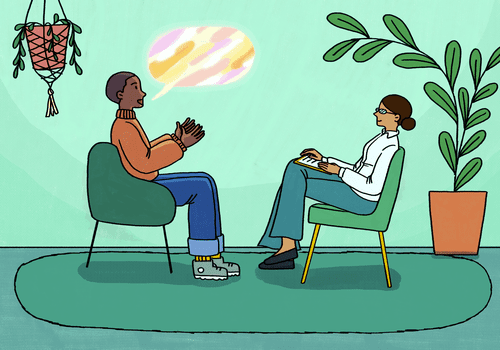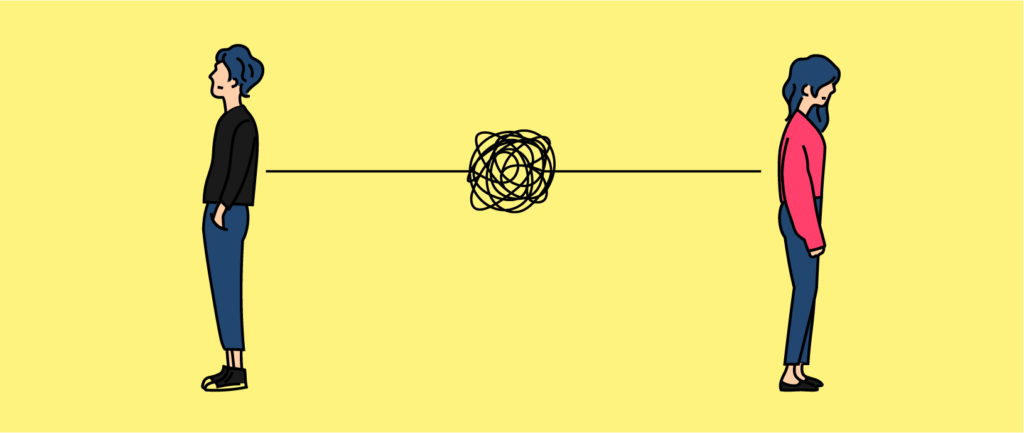Contents
- 1 What Is Interpersonal Process Therapy?
- 1.1 What Does Interpersonal Process Therapy Treat?
- 1.2 Sessions of Interpersonal Process Therapy
- 1.3 Effectiveness Of Interpersonal Process Therapy
- 1.4 Benefits of Interpersonal Process Therapy
- 1.5 Limitations Of Interpersonal Therapy
- 1.6 Alternatives To Interpersonal Process Therapy
- 1.7 What Therapist Should Be Like?
- 2 Conclusion
- 3 A Word From Therapy Mantra
What Is Interpersonal Process Therapy?
 Interpersonal Process Therapy or IPT as we may call it is a form of therapy that deals with relieving the symptoms by improving interpersonal relationships. It has been developed by Gerald Klerman and Myrna Weissman. IPT always helps people address present-day issues and develop one on one relationships in a better way. It helps in solving interpersonal disputes that emerge from conflicting expectations between partners, family members, coworkers, or close friends. It aims to change problematic relationship patterns rather than depressive symptoms.
Interpersonal Process Therapy or IPT as we may call it is a form of therapy that deals with relieving the symptoms by improving interpersonal relationships. It has been developed by Gerald Klerman and Myrna Weissman. IPT always helps people address present-day issues and develop one on one relationships in a better way. It helps in solving interpersonal disputes that emerge from conflicting expectations between partners, family members, coworkers, or close friends. It aims to change problematic relationship patterns rather than depressive symptoms.
What Does Interpersonal Process Therapy Treat?

Interpersonal Process Therapy helps treat ED, delusional depression, and also minor depression. Many people have been able to go back to their normal life after going through this type of therapy. Some other uses of this therapy are:
Grief
Losing a family member or a pet may trigger depression in the form of a response mechanism and IPT helps in treating these symptoms.
Chronic or Long-Standing Illness
When someone has a chronic illness and having to face the consequences is very difficult. IPT focuses on helping people cope with this situation and deal with it better.
Relationships Ending
Breaking up with a loved one or the ending of friendships is very difficult to handle. IPT focuses on helping people deal with these issues in a better way.
Daily Hassles
The focus is on daily stressors such as work, school, and everyday tasks. Managing major changes in life like moving to a new city, starting college may cause stress and can trigger depression. Disturbances in normal daily activities like work, school, etc., due to excessive stress, anxiety, or because of other factors, one can treat this by therapy.
Sessions of Interpersonal Process Therapy
The sessions of interpersonal process therapy are generally weekly and last an hour each.
The opening sessions mainly include gathering information and deciding the course of the therapy. The therapist helps the Patient create an interpersonal inventory.
Middle sessions include patients trying to improve upon a chosen problem area. The focus is on problem-solving.
Furthermore, Final Sessions deal with any sense of loss associated with the end of the therapy. It usually takes 15 to 16 days.
Effectiveness Of Interpersonal Process Therapy

Studies have shown that IPT which addresses interpersonal issues, may be at least as effective as short-term treatment with antidepressants for mild to moderate forms of clinical depression.
- It is considered an effective mode of treatment of mental health disorders.
- Since IPT helps patients work on present-day problems, it is more helpful for people who are less severely depressed. It also helps patients to get over grief and loss. Since IPT focuses on interpersonal relationships, it can also help in improving interpersonal interactions.
- It has been proven to ease depressive symptoms similar to medication therapy. IPT may benefit older adults who tend to respond better.
- However, it has been seen that a combination of both as therapy works the best.
Benefits of Interpersonal Process Therapy

IPT can be used as a primary treatment for major depressive disorder, dysthymic disorder, and bipolar depression.
It also can help with other conditions such as:
Manages Substance Abuse Disorders
IPT help to treat certain patients suffering from substance abuse disorders. Since studies have found that interpersonal problems are one of the major reasons why people resort to drugs or alcohol, this therapy helps in getting rid of these issues and improves interpersonal relationships.
Manages Anger
It can also help people deal with their anger issues and other hostile emotions. People can express themselves more freely and learn how to better handle these situations.
Helps Troubled Personalities
People who have trouble getting along with the world, sometimes as a result of having experienced major life hardships such as sexual abuse or neglect, may benefit from this therapy. Furthermore, this therapy can also help people deal with problems like depression, anger issues, anxiety, etc.
Treats Chronic Heath Diseases
IPT helps people deal with chronic health diseases. Furthermore, these conditions are difficult to deal with and can cause stress in relationships in families. Interpersonal therapy helps people in these cases.
Helps To Deal With Anxiety Disorders
It may benefit people who have anxiety disorders like social phobia or obsessive-compulsive disorder.
Helps To Interpersonal Relationships
It helps in finding ways to cope and improve their interpersonal relationships. Interpersonal therapy focuses more on how people relate to each other. It helps patients in identifying the role interpersonal relationships play in their lives, their strengths and weaknesses. It also helps to know what one can improve.
Limitations Of Interpersonal Therapy

No therapy is perfect and comes with a series of shortcomings or limitations. Limitations of IPT are as follows-
- The person who has come for therapy must be willing to do the introspection and examine his role in the problem.
- Also, the person should have an interest in being active in working on his problems.
- Therapy may not provide relief for people with bipolar disorder.
- Showing improvement may take a longer time. However, this is because it doesn’t focus on specific life events that one can easily identify.
- Besides patients must develop self-awareness as to what is it that they lack in interpersonal relationships.
- The therapy is not suitable for people with psychotic symptoms or who have a suicidal tendency.
- IPT may be inefficient for people whose depression is thought to be the result of a specific situation, such as breastfeeding problems after childbirth.
Awareness and understanding of interpersonal relationships are key to solving them.
Benefits, on the other hand, seem to outweigh the limitations as the treatment is based on short-term treatment so the chances for the patient to drop out of the treatment seems less.
Its research success has led to IPT’s inclusion in clinical treatment guidelines and growing interest among clinicians, but the standards for clinical training for non-researchers are still being defined. Many international organizations, deliberate training issues and allow countries to develop their credentialing processes for IPT.
Alternatives To Interpersonal Process Therapy

With the growing number of options for managing mental health issues without therapy or medication, we can focus on what works best for us. A few of these options are as follows.
Good and Balanced Diet
A healthy, well-balanced diet can help us think clearly and feel more alert. It can also improve concentration and attention span.
Meditation
Benefits include better focus and concentration, improved self-awareness and self-esteem, lower levels of stress and anxiety, and fostering kindness.
Yoga
Yoga has a positive impact on the brain and can help with depression. Furthermore, yoga may also reduce pain and induce flexibility as well as increase energy levels.
Progressive Muscle Relaxation
Tensing and then relaxing of muscles is done, one by one. This helps us release physical tension, which may ease stress and anxiety. It offers a range of benefits including pain relief and better sleep.
Spirituality
Spirituality and religion can play an important role in helping people feel safe, secure, and protected. It enables us to find meaning in life, by seeing ourselves as part of a greater whole. Spiritual practice helps reduce depression, anxiety, stress, and pain.
Movement Therapy
It involves dance, walking, hiking, swimming, or gardening. Furthermore, it can facilitate focus and creativity which can be helpful for people with depression or anxiety.
Acupuncture
It’s an ancient Chinese system of medicine that uses thin needles placed in various parts of the body to treat pain and illness. Furthermore, it is a technique for relieving stress, anxiety, depression, insomnia, and addiction.
Reiki
Reiki is an alternative to medication and therapy, which means ‘Universal life energy. It’s believed that when our life force or energy flow is blocked or disrupted, we can experience pain or illness. Reiki practitioners believe they are channels for universal healing energy which flows through them into the person being treated.
Biofeedback
Biofeedback is a method that enables us to monitor and alter various body functions such as our heart rate, blood pressure, muscle tension, etc. It can help with anxiety, stress, pain management, and some physical conditions.
What Therapist Should Be Like?
 A therapist should help the patient identify any interpersonal issues he or she wants to address, and rank them in order of importance. The role interpersonal relationships play in patients’ lives, their strengths and weaknesses, and what can be done to improve them, all these things are identified by the therapist. The therapist’s job is to help the person find more healthful ways of interacting with others and coping with problems or stressors. The therapist should also offer support regarding clarification of issues, communication analysis, and supportive listening.
A therapist should help the patient identify any interpersonal issues he or she wants to address, and rank them in order of importance. The role interpersonal relationships play in patients’ lives, their strengths and weaknesses, and what can be done to improve them, all these things are identified by the therapist. The therapist’s job is to help the person find more healthful ways of interacting with others and coping with problems or stressors. The therapist should also offer support regarding clarification of issues, communication analysis, and supportive listening.
Conclusion
In short, IPT is a type of therapy that can always help people manage their relationships. It focuses on the here and now, rather than on the past. This makes it a particularly good choice for those who are struggling with current relationships. However, if one thinks IPT might be right for him, he may talk to his therapist or doctor about scheduling an appointment.
A Word From Therapy Mantra
Your mental health — Your psychological, emotional, and social well-being — has an impact on every aspect of your life. Positive mental health essentially allows you to effectively deal with life’s everyday challenges.
At TherapyMantra, we have a team of therapists who provide affordable online therapy to assist you with issues such as depression, anxiety, stress, workplace Issues, addiction, relationship, OCD, LGBTQ, and PTSD. You can book a free therapy or download our free Android or iOS app.


